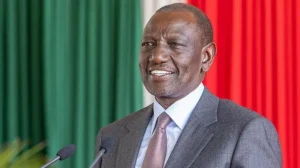Ruto Opens Nairobi Trade Fair, Highlights Agriculture, Trade Reforms
Share
President William Ruto officially opened the 2025 Nairobi International Trade Fair at Jamhuri Park, Nairobi, reaffirming his administration’s commitment to transforming agriculture, enhancing trade, and promoting value addition as the foundation for Kenya’s sustainable economic growth.
Addressing delegates, exhibitors, and farmers at the fair themed “Promoting Climate Smart Agriculture and Trade Initiatives for Sustainable Economic Growth”, Ruto described the event as one of the country’s most important platforms for showcasing innovation in agriculture and business.
“From the dawn of our independence to this very day, agriculture has remained the cornerstone of our economy — the backbone that feeds our nation, drives industries, and provides livelihoods for millions,” Ruto said.
He added that trade, on its part, was “the bloodstream of our prosperity” that connects farm and industrial produce to both domestic and international markets.
Challenges Facing Farmers
The President noted that agriculture in Kenya has long faced challenges including prolonged droughts, unpredictable rainfall, high input costs, fragmented land use, and soil degradation.
On the trade front, he highlighted barriers to regional markets, high logistics costs, and global price volatility as hurdles to competitiveness.
To address these concerns, Ruto outlined sweeping reforms introduced since 2022.
Digital Reforms in Agriculture
He cited the establishment of the Kenya Integrated Agricultural Management Information System (KIAMIS), which has registered 7.1 million farmers compared to just 300,000 in 2022.
Through the platform, subsidies and inputs are distributed directly via e-vouchers, ensuring transparency and efficiency.
“In 2023, we launched KIAMIS to register farmers on a digital platform. Today, millions of farmers access inputs transparently, and policymakers rely on real-time data to respond swiftly,” he stated.
Relief for Consumers
Ruto said the cost of fertilizer had been reduced from KSh7,500 to KSh2,500 per bag through the subsidy programme.
To date, 21.3 million bags valued at KSh53.2 billion have been distributed, saving farmers about KSh105 billion.
He revealed that maize production rose to 67 million bags in 2024, with projections of 70 million this year.
Imports of maize declined by nearly 70% between 2022 and 2024.
The Head of State also pointed to reduced consumer costs, noting that the price of a 2kg packet of maize flour had dropped by 34%, from KSh250 in 2022 to KSh165 in 2025.
The cost of a 90kg bag of maize fell from KSh4,250 to KSh3,250.
Tea and coffee farmers have also benefitted, with tea production rising by 12% and earnings growing 40% to KSh215 billion in 2024.
Smallholder farmers now earn KSh64 per kilogram of green leaf, up from KSh50 in 2022.
Coffee prices improved from KSh79 to KSh120 per kilogram, supported by a KSh3 billion Coffee Cherry Revolving Fund and debt relief worth KSh2 billion.
Avocado, macadamia, cashew, and coconut farmers have also received millions of seedlings since 2022.
In the dairy sector, output has grown by 700 million litres, with farmers guaranteed a minimum price of KSh50 per litre.
Exports have doubled, supported by the distribution of 300 milk coolants.
Value Addition and Industrialization
On industrialization, Ruto reiterated his government’s commitment to value addition.
“Kenya cannot, and will not, continue to be an exporter of raw produce,” he declared, citing investments in special economic zones, county aggregation and industrial parks, and common user facilities in Vipingo, Dongo Kundu, and Naivasha.
These initiatives, he said, would create jobs, raise farmer incomes, and reduce exploitation by brokers.
Expanding Regional and Global Markets
The President stressed the importance of expanding access to regional and continental markets through agreements like the African Continental Free Trade Area (AfCFTA), which provides access to 1.4 billion people and a combined GDP of $3.4 trillion.
Beyond agriculture and trade, Ruto highlighted progress in other sectors, including the construction of 170,000 affordable houses, reforms in higher education financing, plans to hire 100,000 teachers, and the enrollment of 26.5 million Kenyans under the Social Health Authority.
“These reforms are not isolated steps. They represent a bold and deliberate plan to reshape our economy and society. Kenya has never lacked resources or talent; what was missing was focus and bold leadership,” Ruto remarked.
He urged Kenyans to embrace excellence, declaring: “Our destiny is not average; it is extraordinary. That excellence is real, possible, and within reach.”
The President concluded by officially declaring the 2025 Nairobi International Trade Fair open.

Kenyan President Dr. William Ruto in a past event. PHOTO/ PCS
